Is That Why the Senator Downplays the Date?
A Native Commentator Might Be Best Response
Covering COVID Takes Toll on Journalists
Alcindor Pledges to Think of the Vulnerable
Philly Inquirer Plans Year-Long Project on Racism
‘News Directing While Black,’ Explained
White House Fills Posts for Black, Hispanic Media
Media Cover Environmental Impact, Not Injustices
Extremist Gets 3½ Years; Targeted Journalists
Short Takes
[btnsx id=”5768″]
Is That Why the Senator Downplays the Date?
It’s anyone’s guess whether Mitch McConnell would have expected that his latest attack on “The 1619 Project,” in which the Senate minority leader argues that the year enslaved Africans arrived in Virginia was really not an important date in U.S. history, would prompt a discussion about the McConnell family’s own slaveholding past.
But that’s what happened Tuesday on MSNBC’s “The ReidOut,” when host Joy Reid brought on Nikole Hannah-Jones, the New York Times Magazine writer who created the award-winning project on the origins of slavery in the United States.
McConnell said Monday at the University of Louisville, “I think this is about American history and the most important dates in American history. And my view — and I think most Americans think — dates like 1776, the Declaration of Independence; 1787, the Constitution; 1861-1865, the Civil War, are sort of the basic tenets of American history,” Morgan Watkins reported for the Courier Journal in Louisville, Ky.
I am so honored to reveal the covers of the first #1619Project books: THE 1619 PROJECT: A NEW ORIGIN STORY, which dramatically expands the original project, & the children’s picture book BORN ON THE WATER, both to publish by @OneWorldLit Nov. 16. Info at https://t.co/zVmhloeMey pic.twitter.com/NJmzh5xXGV
— Ida Bae Wells (@nhannahjones) April 13, 2021
“There are a lot of exotic notions about what are the most important points in American history. I simply disagree with the notion that The New York Times laid out there that the year 1619 was one of those years.
“I think that issue that we all are concerned about — racial discrimination — it was our original sin. We’ve been working for 200-and-some-odd years to get past it,” McConnell continued. “We’re still working on it, and I just simply don’t think that’s part of the core underpinning of what American civic education ought to be about.”
Reid said Tuesday on “The ReidOut,” “Nikole, I have to go to you first because you have been firing them up, throwing WBD, the boys down, you know, like firecrackers all over Twitter.”
Reid noted that McConnell (pictured below, by Michael Clevenger/Courier Journal) has “also said that he’s attacking President Biden’s anti-racism focus, and he’s said it’s divisive and he`s joining in the protests against teaching systemic racism, saying it would give students a slanted story.”
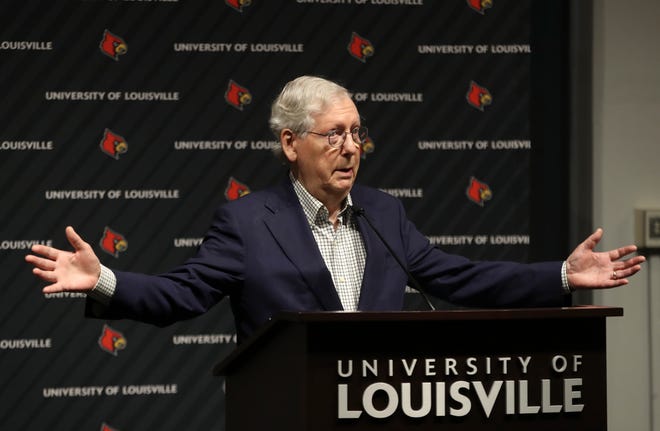 Hannah-Jones replied, “1619 was an important date for Mitch McConnell’s own family, because his own family left Virginia, came to Alabama to start cotton plantations, owned dozens of other human beings and his own wealth and status [were] acquired because of the legacy of slavery.
Hannah-Jones replied, “1619 was an important date for Mitch McConnell’s own family, because his own family left Virginia, came to Alabama to start cotton plantations, owned dozens of other human beings and his own wealth and status [were] acquired because of the legacy of slavery.
“So we know that . . . no one can argue that 1619 was not a foundational date in American history. It nearly led to the demise of our entire nation in 1865 but also it was personally important for Mitch McConnell himself. So when you hear people like him saying that teaching the facts of American history [is] divisive, maybe that’s because we have a divisive history in this country. So he’s not saying that we shouldn’t teach the truth, he’s saying that apparently the truth is too difficult for our nation to bear and that we’re far too fragile to be able to withstand the scrutiny of the truth.”
Reid responded, “Thank you, first because now we understand why he doesn’t want it taught because I don’t want you to learn about me. Tom Cotton had the same issue.”
Reid then referenced Hannah-Jones’ tweets that day noting “that [scholar-activist W.E.B.] Du Bois wrote — and I think this is so brilliant, that people should read more Du Bois — that the facts of American history have been — in the last half century — been falsified because the nation was ashamed but also that history has one of two purposes, either to inform you and make you know it, make you understand the past or to assuage your need to feel heroic.
“And American history has, up until now, really been taught as a balm to make Americans feel patriotic and feel good about the country, not as a way to inform people. Most Americans don`t know very much about American history.”
“From the mind of the talented executive producer who brought us the acclaimed ABC series, ‘Soul of a Nation,’ we present the animated short film, ‘White Fatigue.’ Authored and narrated by Robe Imbriano and executive produced and creative directed by BigStar’s own Josh Norton, the film was created to drive awareness around the phenomenon of white fatigue and how it perpetuates systemic racial inequality and injustice. . . .”
Hannah-Jones isn’t the first to note the slaveholding background of McConnell’s family. “Two of his great-great-grandfathers were slave owners, U.S. census records show,” Corky Siemaszko reported in 2019 for NBC News.
On The Root Thursday, Michael Harriot (pictured) took a different tack.
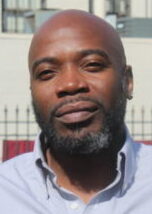 “The Root decided to see what some of the signatories to Mitch McConnell’s Strawberry Letter knew about slavery and Black history. We dug through state curriculum standards, yearbooks and spoke with teachers to see which interpretation of history the white tears-spewing politicians learned when they were in elementary and high school.”
“The Root decided to see what some of the signatories to Mitch McConnell’s Strawberry Letter knew about slavery and Black history. We dug through state curriculum standards, yearbooks and spoke with teachers to see which interpretation of history the white tears-spewing politicians learned when they were in elementary and high school.”
Harriot’s conclusion: “This is why they oppose expanding the historiography of our national story. American schools have never taught a version of history that wasn’t racialized. But, apparently, it’s perfectly fine if the racial narrative skews toward whiteness. They can’t be opposed to learning a different historical perspective because they never learned history; they were spoonfed fiction in bite-sized morsels.”
- Charles M. Blow, New York Times: Is America a Racist Country? (May 2)
- Jarvis DeBerry, NOLA.com: Ray Garofalo won’t get to pass his shaky grasp of history down to Louisiana’s students
- Elvia Díaz, Arizona Republic: Teachers could be fined $5,000 if anything ‘controversial’ is taught. That’s crazy
- Editorial, News & Record, Greensboro, N.C.: A monumental shift (April 27)
- LZ Granderson, Los Angeles Times: What’s the GOP today? A party obsessed with ‘woke supremacy,’ cancel culture and voter suppression
- Adam Harris, the Atlantic: The GOP’s ‘Critical Race Theory’ Obsession
- Media Matters for America: Joy Reid calls out Tucker Carlson for calling her “the race lady”
- Laura Meckler and Hannah Natanson, Washington Post: As schools expand racial equity work, conservatives see a new threat in critical race theory
- Clarence Page, Chicago Tribune: The complicated road to slavery reparations — and the need for an apology (April 27)
- Bethania Palma, snopes.com: Did Mitch McConnell Pose in Front of a Large Confederate Flag? (Feb. 10, 2017)
- Clark Pollitt, Courier Journal, Louisville, Ky.: Time to stand with the Black community and tell ‘My Old Kentucky Home’ good night (April 30)
- Will Sutton, NOLA.com: Holistic history, critical race thinking is necessary. Limiting education is wrong.
- Will Sutton, NOLA.com: Good, bad and ugly? Race is a fact, not a theory. Someone tell Rep. Garofalo.
- Baratunde Thurston, TED Talks: How to Deconstruct Racism One Headline at a Time
- Linn Washington, thiscantbehappening.net: Bootlickers Blind To Evidence Of Institutional Racism
- Morgan Watkins, Courier Journal, Louisville, Ky. University of Louisville criticizes alum Mitch McConnell for 1619 slavery comments
- Richard Webner, Washington Post: Alamo renovation gets stuck over arguments about slavery
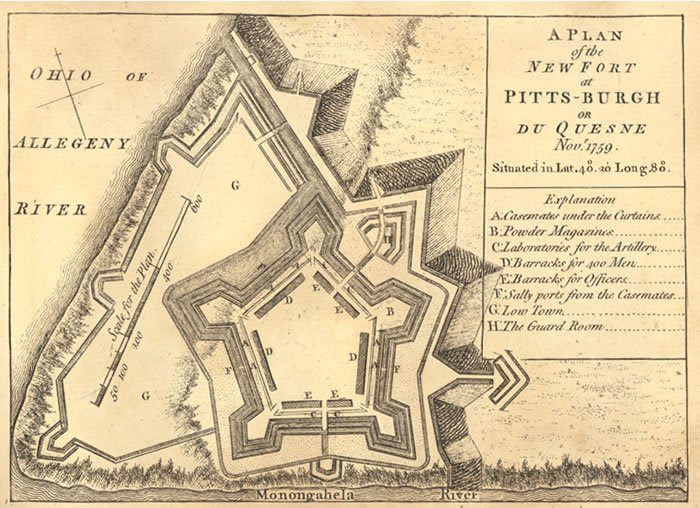
A Native Commentator Might Be Best Response
“CNN analyst Rick Santorum’s claim that he misspoke during a recent speech where he said there was ‘nothing here’ when the United States was founded did little to diminish anger against him,” David Bauder reported Tuesday for the Associated Press.
“The National Congress of American Indians on Tuesday renewed calls for CNN to fire the former Pennsylvania senator. The group’s president, Fawn Sharp, called Santorum arrogant for comments made to Chris Cuomo on Monday night.
“ ‘I was optimistic he would own it, he would recognize it and he would apologize,’ Sharp said, ‘but he did none of those things.’
“CNN has not commented on Santorum’s initial remarks in an April 23 speech before Young America’s Foundation, a conservative youth organization, and did not on Tuesday, either. There’s been no indication of a change in status for Santorum, a commentator who was often tasked with giving the Republican point of view during campaign coverage. . . .”
Bauder also wrote, “CNN’s Don Lemon . . . said he was furious watching the interview in his office and wanted to apologize to viewers who were insulted by it. . . .
“Sharp said anger against CNN was building in Native American communities and that a petition circulating calling for Santorum’s firing has more than 15,000 signatures.”
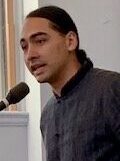 In Canada’s National Observer on Wednesday, Julian Brave NoiseCat (pictured) of the Canim Lake Band Tsq’escen outlined European “treachery” against Native people, then wrote, “it’s impossible to understand the United States’ landmass, its property system, its federal government, its corruption, its violence, its obsession with guns and its conception of freedom without Indigenous Peoples.
In Canada’s National Observer on Wednesday, Julian Brave NoiseCat (pictured) of the Canim Lake Band Tsq’escen outlined European “treachery” against Native people, then wrote, “it’s impossible to understand the United States’ landmass, its property system, its federal government, its corruption, its violence, its obsession with guns and its conception of freedom without Indigenous Peoples.
“And yet there are so many Rick Santorums who opine on the nature of a nation built on land, life, liberty and so much else taken, borrowed or otherwise lifted from Native people without even the basic acknowledgment of our presence, our contributions and our losses.
“I’m not sure CNN should can Santorum, as many of my Native colleagues would like. I’m worried that might just turn him into the latest martyr of the ‘cancel culture’ wars. Santorum hasn’t won an election since Sen. Bob Casey beat him by 18 points in 2006, and it’s probably unwise to unintentionally elevate the voice of a man who encounters his own thoughts so clumsily at a time when the conservative movement is losing its grip on reality.
“Perhaps, instead, CNN could help fight the pervasiveness of Santorum-style ignorance by hiring a regular on-air Native contributor. Native contributions to American life are many. But we’ve never had one of our own as a regular on CNN.”
- Evan Brechtel, Second Nexus: Writer Schools Santorum With Reminder of How U.S. Constitution Was ‘Lifted From Native American Culture’ (May 2)
- Ray Halbritter, Daily News, New York: Native Americans’ gift to the United States: What Rick Santorum needs to learn
- Sierra Teller Ornelas, Washington Post: I am getting sick of writing these pieces to respond to people like Rick Santorum
- Ben Railton, Saturday Evening Post: Considering History: Everything Rick Santorum Got Wrong about American History and Identity (April 28)
- Erik Wemple, Washington Post: Santorum flails and fails in CNN appearance following comments on Native American culture
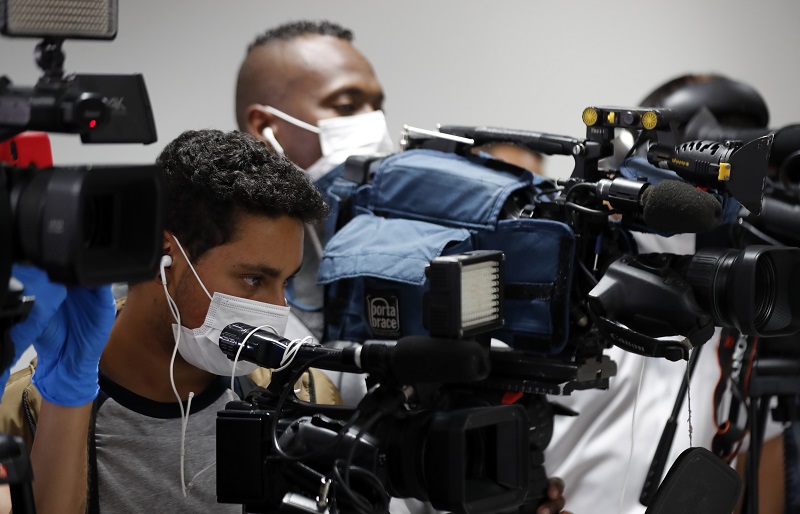
Covering COVID Takes Toll on Journalists
“Much has been written about burnout among healthcare workers and teachers and lawyers, and about how the mental health crisis has created a ‘parallel pandemic’ of PTSD [post-traumatic stress disorder] and anxiety and depression,” Olivia Messer wrote Thursday for Study Hall. She quit her job as lead COVID reporter at the Daily Beast.
“But, despite the spate of headline-worthy media departures, the industry has failed to examine how and why COVID reporters in particular are struggling so much — or what can be done about it,” Messer continued.
In “between meetings and interviews and filing stories, I was falling apart. . . .”
Messer quoted Bruce Shapiro, executive director of the Dart Center for Journalism and Trauma: “For COVID reporters, there are some specific challenges I’m just beginning to understand. You’re spending your lives immersed in sounds and images and consequences of the pandemic in a way that probably is flooding your image bank. That can make it harder to set up the kind of boundaries that we need to do our jobs. . . .”
“ ‘Journalists are like therapists without the training,’ said Jessi Gold, an assistant professor in the department of psychiatry at Washington University in St. Louis. . . .”
- Rebecca A. Clay, American Psychological Association: Journalists as vicarious first responders (April 17, 2020)
- Joe Davidson, Washington Post: The pandemic has made it harder to find mental health resources, while also deepening the need
- Kristen Hare and Aiyana Ishmael, Poynter Institute: The journalists and colleagues we’ve lost to the coronavirus
- International Center for Journalists: Covering COVID-19: Resources for Journalists
- Mia Jankowicz, Insider: A journalist in India live-tweeted his worsening COVID-19 symptoms, then died before he could get help (April 20)
- Kaiser Health News: From Covid Coverage to ‘Public Option’ Plans, Journalists Delve Into Details
- South Asian Journalists Association: Media advisory on the new Covid variant in India
- Brian Stelter, CNN: Tucker Carlson’s Fox News colleagues call out his dangerous anti-vaccination rhetoric
- United Nations: COVID-19: an unprecedented news story for journalists
“Democrats have been toying…with negotiating…with Republicans over [Biden’s jobs plan],” says @JakeSherman.
“When Congress comes back…they are going to be…less interested in waiting for Republicans…they believe time is of the essence.”
Watch: https://t.co/cazYQVvcaK pic.twitter.com/bDrKX1tHpO
— Washington Week | PBS (@washingtonweek) May 8, 2021
Alcindor Pledges to Think of the Vulnerable
Yamiche Alcindor concluded her first night as official host of “Washington Week” on PBS Friday by thanking panelists Errin Haines of The 19th, Jake Sherman of Punchbowl News, Dan Balz of The Washington Post, and Weijia Jiang of CBS News.
Then she said, “This show has an incredible legacy, and I am thrilled, thrilled to step into it and to expand it. I was lucky enough to know and to be mentored by Gwen Ifill, a longtime host of this show. I am thinking of her – her brilliance, her tenacity – today and every day.
“Know that my guiding – my guiding light will be centering this show on the decisions made in Washington and beyond and how they impact everyday Americans and vulnerable populations. I hope that you’ll see the questions that you have about politics and power represented here at this table. Please join me every week.”
Among the viewers was Lynne Adrine, veteran journalist and director of the D.C. Graduate Program, Broadcast and Digital Journalism, at Syracuse University. “I was crying,” Adrine messaged Journal-isms. “I know how Gwen mentored Yamiche. And the love her panel showed her…man.”
Philly Inquirer Plans Year-Long Project on Racism
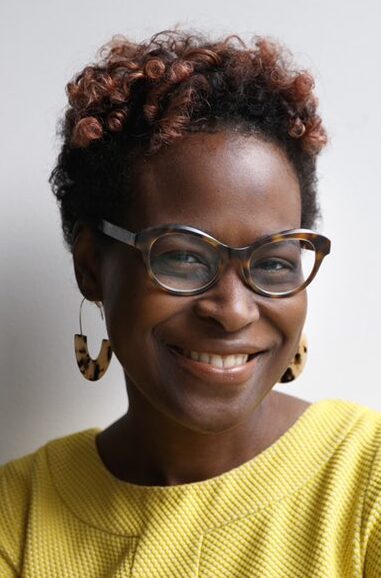 “Today, we will formally announce and launch ‘A More Perfect Union,’ a year-long, multi-platform project that explores the racist origins, practices, and consequences of American institutions that were born in Philadelphia — as well as the path forward and push toward solutions,” Philadelphia Inquirer Publisher Lisa Hughes and Editor Gabe Escobar declared Wednesday.
“Today, we will formally announce and launch ‘A More Perfect Union,’ a year-long, multi-platform project that explores the racist origins, practices, and consequences of American institutions that were born in Philadelphia — as well as the path forward and push toward solutions,” Philadelphia Inquirer Publisher Lisa Hughes and Editor Gabe Escobar declared Wednesday.
“The series will begin with an examination of The Inquirer itself: This is essential, given our 192-year history in Philadelphia and our past year of racial and cultural reckoning.
“Errin Haines (pictured) — an award-winning journalist, Inquirer contributor, and Philadelphia resident — will lead the project as Contributing Editor. Errin will report to Gabe and will produce the series with Inquirer staff as well as community contributors. Many of you know Errin from her work as Editor at Large of The 19th, a nonprofit, nonpartisan newsroom covering the intersection of women, politics, and policy. . . .”
In December, The Kansas City Star published a six-part package apologizing for its racist past. The Star project followed similar introspection by the Los Angeles Times in September and in December by Stuff, the most popular news website in New Zealand, about media portrayal there of the native Maoris. (scroll down). All were part of the reckoning prompted by the killing of George Floyd a year ago by Minneapolis police.
An independent review released in February found that the Inquirer “has an overwhelmingly white newsroom and fails to retain journalists of color, resulting in news coverage that overrepresents people who are white and male,” as the Inquirer reported.
In March, the Inquirer and the Philadelphia Association of Black Journalists agreed to work together to create more opportunities for Black and other journalists of color and to drive stronger connection to the Philadelphia community.
- Robin Hoecker, Howard Journal of Communication via researchgate.net: News Media Apologies for Racist Coverage (January)
- Mark I. Pinsky, Poynter Institute: Maligned in black and white: Southern newspapers played a major role in racial violence. Do they owe their communities an apology? (May 2019)
‘News Directing While Black,’ Explained
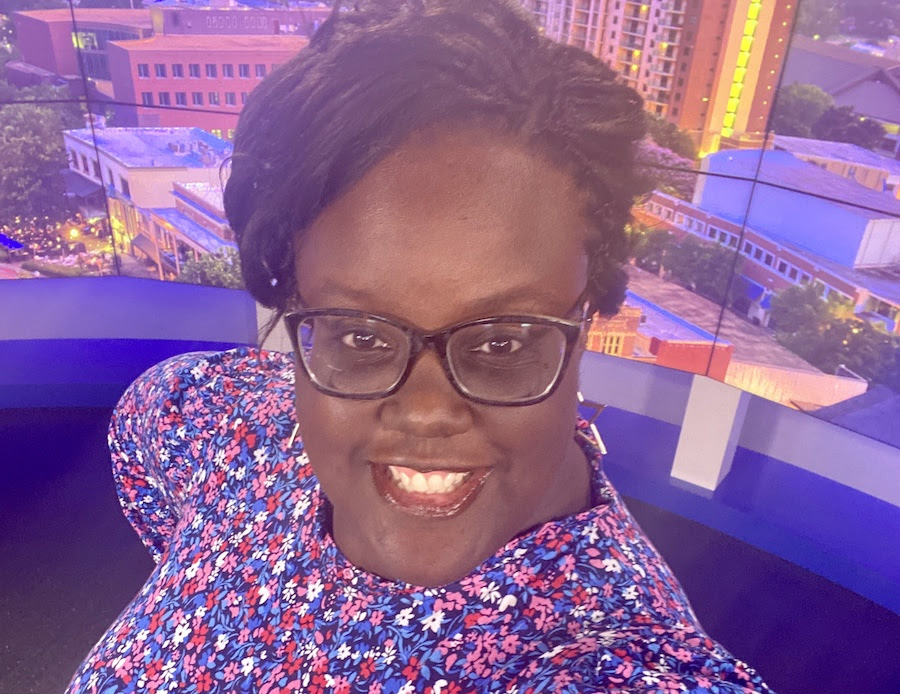 What’s it like being a Black news director?
What’s it like being a Black news director?
“While it’s tough at times, I know that I’m in a position to do a lot of good,” Vicki Bradley (pictured), news director of WTXL-TV in Tallahassee, Fla., wrote Wednesday for the Radio Television Digital News Association.
“I’m in a position to give a voice to communities that do not feel they’re being heard. I’m in a position to dig beyond the surface when our communities have questions that aren’t being answered. As journalists we’re also in a position where we can unite people with hopes of bringing about change. We can be the ones to move our communities forward when it feels like there is such division.”
Yet Bradley also wrote, “I remember getting a call from a reporter on a Saturday afternoon. She and a photographer were covering a peaceful demonstration. In keeping with being balanced, she attempted to talk to counter protesters. When she and another reporter got ready to do their interview, the white man refused to answer my Black reporter’s questions. He didn’t have an issue talking to a white reporter from the competition. It was so obvious that his refusal was racially motivated that the reporter from the competing station took the lead asking questions for both of them. That was a tough call to get.
“It also wasn’t the only time I would hear from a reporter who felt like doing their job was made harder because they were Black. It’s now 2021 and the social justice movements are still going strong. The calls for change are louder than ever and it felt like things were slowly moving in a better direction. But then it happened again. Another Black man killed in the Minneapolis area by an officer. . . .”
Bradley quoted a note she sent to her staff last May 30 that read in part, “We cannot let these things stop us from doing our jobs. You are all journalists. Like I said Friday morning, we all got into this for a reason. Hold onto that and don’t let it go. Let it fuel your fire to be the best you can be for the communities that watch us.”
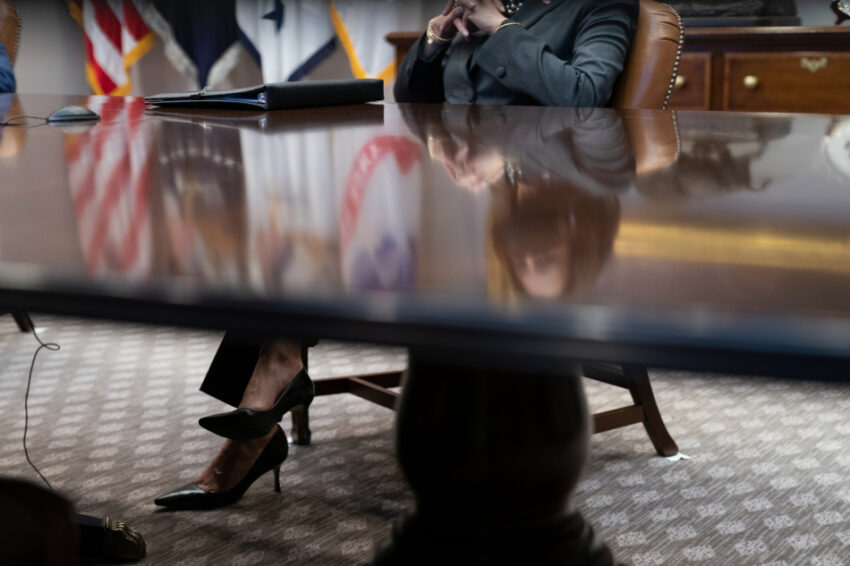
“What I love about this photo is how boss she looks,” Jackson wrote April 29. “I’d have to look up what meeting it was, but I knew when I saw the reflection – along with the hand and feet gestures – I had to try and make a picture out of this.’ Jackson, a Black photojournalist, had worked for the Associated Press and The Virginian-Pilot in Norfolk before becoming a photographer for the Obama White House. (Credit: Lawrence Jackson/White House)
White House Fills Posts for Black, Hispanic Media
The Biden White House has revived the positions of director of African American media and director of Hispanic media, naming Erica P. Loewe and Audrey E. Lopez, respectively, to those positions.
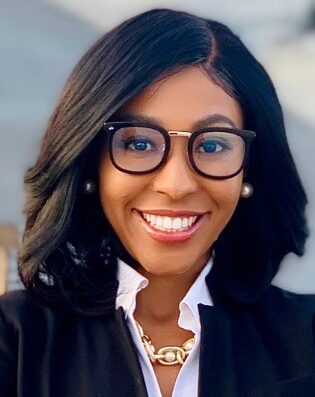 Loewe (pictured) was deputy communications director to House Majority Whip James E. Clyburn and Financial Services Committee Chairwoman Maxine Waters. Lopez describes herself as a communications strategist.
Loewe (pictured) was deputy communications director to House Majority Whip James E. Clyburn and Financial Services Committee Chairwoman Maxine Waters. Lopez describes herself as a communications strategist.
 Lopez’s (pictured) Twitter feed has been populated with statements about border issues and interactions with Latin American leaders, as well as a report on an April 20 Oval Office meeting with leadership of the Congressional Hispanic Caucus.
Lopez’s (pictured) Twitter feed has been populated with statements about border issues and interactions with Latin American leaders, as well as a report on an April 20 Oval Office meeting with leadership of the Congressional Hispanic Caucus.
She also reported that Dr. Jill Biden’s first solo morning news interview as first lady was with Telemundo, a Spanish-language network.
In addition to Loewe’s service with Clyburn and Waters, Black Enterprise noted that in 2012, Loewe was included in the magazine’s roundup of recent college graduates who offered advice about making the best first steps into the job market.
Loewe told Journal-isms that there are as yet no “specialty media” representatives for other ethnicities, but they might contact Jen Molina. In the Obama White House in 2012, Kevin S. Lewis was director of African American media, Luis Miranda was director of Hispanic media and Shin Inouye was director of specialty media.

Media Cover Environmental Impact, Not Injustices
“Even though environmental pollution affects everyone, low-income communities and communities of color are often disproportionately harmed by poor air, water, and soil caused by fossil fuel pollution and chemical contamination,” Evlondo Cooper reported Thursday for Media Matters for America.
“This is no accident: The industries causing the bulk of this pollution lobby vociferously to weaken environmental regulations at the local, state, and federal level, while seeking to avoid accountability for the harm that results from lax standards and choosing to site their physical infrastructure near vulnerable communities.
“Media Matters analyzed broadcast news coverage of any environmental pollution impacts to the air, water, and soil — particularly as caused by fossil fuel and chemical industries — regulatory actions that would affect specific communities or demographic groups, and environmental health hazards that pose risks to specific demographic groups or communities from January 2017 through December 2020. For the purposes of this study, we counted mentions of a socially marginalized population as an environmental justice segment.
“Our study found 11.4%, or 30 of 264, corporate broadcast morning and evening news segments included a mention of how these environmental pollution impacts, regulations, or health hazards specifically affected a particular demographic group. But rarely did these environmental justice segments contextualize the disproportionate harm environmental injustice has on socially marginalized communities due to systemic inequalities and injustices. In short, environmental pollution impacts were reported, but injustices were not. . . .”
Extremist Gets 3½ Years; Targeted Journalists
“A former leader of an extremist group was sentenced to three and a half years in prison on Tuesday for his role in a ‘swatting’ scheme whose targets included journalists, a sitting cabinet secretary and a predominantly Black church, federal prosecutors said,” Allyson Waller reported for The New York Times.
 “John Cameron Denton (pictured), 27, of Montgomery, Texas, whom the Justice Department identified as a former leader of the Atomwaffen Division, a paramilitary neo-Nazi group, was sentenced to 41 months in prison for his role in a swatting conspiracy in which he and others reported false claims involving ‘pipe bombs, hostage takings or other violent activity’ to the authorities in hopes of drawing a forceful police response to the front door of an unwitting third party.
“John Cameron Denton (pictured), 27, of Montgomery, Texas, whom the Justice Department identified as a former leader of the Atomwaffen Division, a paramilitary neo-Nazi group, was sentenced to 41 months in prison for his role in a swatting conspiracy in which he and others reported false claims involving ‘pipe bombs, hostage takings or other violent activity’ to the authorities in hopes of drawing a forceful police response to the front door of an unwitting third party.
“Their efforts led to attacks on 134 locations across the country from October 2018 to February 2019, according to the United States Attorney’s Office for the Eastern District of Virginia. Prosecutors said that Mr. Denton and many of his co-conspirators ‘chose targets because they were motivated by racial animus.’ . . .”
Those singled out included Miami Herald columnist Leonard Pitts Jr., ProPublica reporter A.C. Thompson and an unnamed member of the Arizona Association of Black Journalists.
Asked Tuesday on Twitter, “How are you with all this? It must feel like a lifted load,” Pitts replied, “Not really. I can’t say I lost a lot of sleep over him. Not to be cynical, but he is the cost of doing business. — my business, at least — in a nation that is losing its mind.”
Short Takes
- USA Today journalists Monday published “Boots on the Ground,” a 22-minute documentary, and a long-form column based on the time they spent in Minneapolis leading up to, during and after the trial and conviction of Derek Chauvin, spokeswoman Hayley Hoefer messaged on Tuesday. Senior video producer Jarrad Henderson and video journalist Harrison Hill, embedded with community members, produced the documentary. National columnist Suzette Hackney wrote the column reflecting on her weeks there.
- “Native Sun News Today Publisher Tim Giago has decided to sponsor a National Native American Media Convention on Native American Day in October,” the Native Sun News editorial board wrote Friday for indianz.com. The board also wrote, “The conference will feature classes for young Native journalists, workshops for editors and publishers, and an array of great Native media professionals as speakers. Giago was disappointed that the Native American Journalists Association decided to cancel its convention this year, but he felt this is such an important and critical [year] for news makers that there had to be a national meeting to address some of the media problems still confronting Indian Country.”
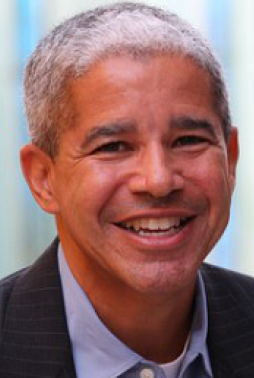 Insiders claim that Marc Lacey (pictured), New York Times assistant managing editor, is viewed as the strongest external candidate to succeed Martin Baron as executive editor of The Washington Post, Maxwell Tani, Lachlan Cartwright and Lloyd Grove reported Thursday for the Daily Beast. “Lacey is a prominent Black journalist held in very high regard at the Times. A member of two Pulitzer Prize-winning teams, the former Times national editor and foreign correspondent would represent the kind of splashy big-name (and diverse) hire that insiders said Post publisher Fred Ryan may be interested in. However, Lacey is further down the managerial line at the Times and, insiders suggested, his hire would potentially irk some editors at the Post who may be viewed as more qualified than him.” The internal favorite is Post national editor Steve Ginsberg, they wrote.
Insiders claim that Marc Lacey (pictured), New York Times assistant managing editor, is viewed as the strongest external candidate to succeed Martin Baron as executive editor of The Washington Post, Maxwell Tani, Lachlan Cartwright and Lloyd Grove reported Thursday for the Daily Beast. “Lacey is a prominent Black journalist held in very high regard at the Times. A member of two Pulitzer Prize-winning teams, the former Times national editor and foreign correspondent would represent the kind of splashy big-name (and diverse) hire that insiders said Post publisher Fred Ryan may be interested in. However, Lacey is further down the managerial line at the Times and, insiders suggested, his hire would potentially irk some editors at the Post who may be viewed as more qualified than him.” The internal favorite is Post national editor Steve Ginsberg, they wrote.
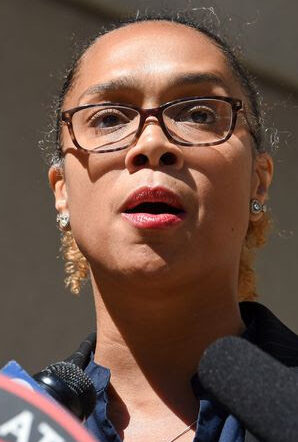 “The Baltimore State’s Attorney’s Office says it filed a complaint with the Federal Communications Commission on Wednesday requesting an investigation of WBFF, the Sinclair-owned Fox-affiliated TV station in Baltimore,” David Zurawik reported Thursday for The Baltimore Sun. “The letter of complaint written by Zy Richardson, communications director, alleges a pattern of coverage of the state’s attorney’s office that is ‘blatantly slanted, dishonest, misleading, racist, and extremely dangerous.’ It further charges that the station has engaged in what ‘appears to be an intentional crusade’ against Baltimore State’s Attorney Marilyn Mosby (pictured), ‘which given today’s politically charged and divisive environment, is extremely dangerous.’ . . .” WBFF response
“The Baltimore State’s Attorney’s Office says it filed a complaint with the Federal Communications Commission on Wednesday requesting an investigation of WBFF, the Sinclair-owned Fox-affiliated TV station in Baltimore,” David Zurawik reported Thursday for The Baltimore Sun. “The letter of complaint written by Zy Richardson, communications director, alleges a pattern of coverage of the state’s attorney’s office that is ‘blatantly slanted, dishonest, misleading, racist, and extremely dangerous.’ It further charges that the station has engaged in what ‘appears to be an intentional crusade’ against Baltimore State’s Attorney Marilyn Mosby (pictured), ‘which given today’s politically charged and divisive environment, is extremely dangerous.’ . . .” WBFF response
 “Ubah Ali (pictured), 25, Wisconsin’s first and America’s third reporter to wear the hijab on the air, joined TMJ4 [WTMJ-TV] as a reporter and multimedia journalist in March,” Sandra Whitehead reported April 16 for the Wisconsin Muslim Journal. “In her first televised broadcast for TMJ4, she reported April 5 on Wisconsin’s COVID vaccinations from a pop-up clinic at the landmark Milwaukee Public Market.” Whitehead also wrote, “Breaking ground as Wisconsin’s first hijab-wearing on-air reporter is ‘not top-of-mind,’ Ali said. ‘It’s just who I am.’ ”
“Ubah Ali (pictured), 25, Wisconsin’s first and America’s third reporter to wear the hijab on the air, joined TMJ4 [WTMJ-TV] as a reporter and multimedia journalist in March,” Sandra Whitehead reported April 16 for the Wisconsin Muslim Journal. “In her first televised broadcast for TMJ4, she reported April 5 on Wisconsin’s COVID vaccinations from a pop-up clinic at the landmark Milwaukee Public Market.” Whitehead also wrote, “Breaking ground as Wisconsin’s first hijab-wearing on-air reporter is ‘not top-of-mind,’ Ali said. ‘It’s just who I am.’ ”
 Kristen Aguirre (pictured), one of three Latinas let go in the last year from KUSA-TV in Denver, has landed at WLOS-TV in Asheville, N.C. “She’s so excited to call Asheville her new home, and she’s ready to get involved in the community!” WLOS-TV says. In Denver, “Aguirre’s struggles with management began after the healthy young woman had a stroke in April 2019 that left her paralyzed down one side of her body,” Elizabeth Hernandez wrote April 19 for The Denver Post. “After months of rehabilitation with family and coworkers by her side, Aguirre re-learned how to walk and began outpatient therapy, eventually easing back into her job part-time while still on disability.” Aguirre told Hernandez, “I realized then that no matter what I did, even when I did everything they threw at me, something was always wrong about my work. Which is something people with disability face. They will do anything to push you out.”
Kristen Aguirre (pictured), one of three Latinas let go in the last year from KUSA-TV in Denver, has landed at WLOS-TV in Asheville, N.C. “She’s so excited to call Asheville her new home, and she’s ready to get involved in the community!” WLOS-TV says. In Denver, “Aguirre’s struggles with management began after the healthy young woman had a stroke in April 2019 that left her paralyzed down one side of her body,” Elizabeth Hernandez wrote April 19 for The Denver Post. “After months of rehabilitation with family and coworkers by her side, Aguirre re-learned how to walk and began outpatient therapy, eventually easing back into her job part-time while still on disability.” Aguirre told Hernandez, “I realized then that no matter what I did, even when I did everything they threw at me, something was always wrong about my work. Which is something people with disability face. They will do anything to push you out.”
- As part of National Geographic’s April 2018 “The Race Issue,” Susan Goldberg — the publication’s first woman and first Jewish editor-in-chief since its founding in 1888 — flatly denounced National Geographic’s troubled history. Her mea culpa was headlined, ‘For Decades, Our Coverage Was Racist. To Rise Above Our Past, We Must Acknowledge It.’ However, Anna North and Kainaz Amaria reported Thursday for vox.com, “change has been slow and difficult over the past three years, and many current and former staffers deem it inadequate. . . . Vox spoke with nearly 20 current and former National Geographic staffers . . who described instances in which employees tried to speak up about racial insensitivities in coverage, only to have their concerns brushed aside or ignored. . . .”
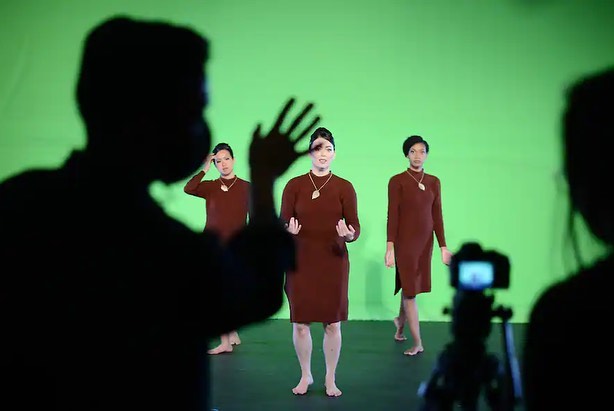
- “Pete Flood, head baseball coach at Olathe North High School, needs to be fired after aiming the n-word at the only Black player on the team,” the Kansas City Star editorialized Friday. “In a Friday Facebook post, the player’s father, Tony Banks, said his son and another player on the team set up speakers and were playing rap music during batting practice before a game with Olathe South. Banks said Flood walked up to his son, ‘looked him in the eyes, and told him, “We don’t play that n_____ music over here. We only play country and rock music.” ‘ “
- In Pennsylvania, “The district attorney in Bedford County will bring charges against a man who shot at civil rights marchers last August, striking one person in the face,” Joseph Darius Jaafari and David Hurst reported Friday for The Tribune-Democrat in Johnstown, Pa., as part of the Spotlight PA consortium of media outlets. “The announcement from Lesley Childers-Potts came just days after Spotlight PA and the Johnstown Tribune-Democrat learned she had been given the results of a State Police investigation into the shooting in early March. . . . She did not respond to a follow-up question asking why she had not made a decision, despite having the State Police report for two months.”
- Mumia Abu-Jamal survived double bypass open heart surgery, his supporters said Friday. “Mumia wanted everyone to know that he was aware that the movement made it possible for his condition to be taken seriously and finally accurately diagnosed,” said Noelle Hanrahan, a spokesperson for Abu-Jamal’s supporters. “Mumia knows that if it were not for the world shining a bright hot spotlight on prison conditions and access to medical care, he fears that he would not have survived.” Last month, U.N. human rights experts expressed serious concerns about the treatment and welfare of Abu-Jamal, a onetime Philadelphia radio journalist who has been in jail for 40 years after his conviction for killing a police officer in 1981.
- We “are excited to announce the introduction of The New York Times Editing Residency, which will provide up to two years of extensive training and support,” the Times announced Friday. “Through this paid residency, the company commits to fostering and nurturing the next generation of editors. We plan to attract and develop candidates of diverse backgrounds, and give them the tools and training they need to help shape journalism in the future — at The Times and elsewhere. . . . We plan to open applications for these paid positions in early June, with some of our editors starting in fall 2021. We will post the application link in the coming weeks on our career page.”
 “The Atlantic’s CEO Nick Thompson announced that Andrea Valdez (pictured) is joining his senior leadership team as senior vice president of audience strategy later this month,” the publication said Wednesday. “Valdez is the founding editor in chief of the nonprofit, independent news organization The 19th, and was previously an editor at The Texas Observer, Wired, and Texas Monthly.”
“The Atlantic’s CEO Nick Thompson announced that Andrea Valdez (pictured) is joining his senior leadership team as senior vice president of audience strategy later this month,” the publication said Wednesday. “Valdez is the founding editor in chief of the nonprofit, independent news organization The 19th, and was previously an editor at The Texas Observer, Wired, and Texas Monthly.”
- “Moving ahead, you’ll see Pew Research Center do more to explore diversity within racial and ethnic groups in the U.S., in addition to our traditional comparisons across groups,” Michael Dimock, president of the center, said Thursday in an emailed quarterly update. “Recent examples include studies on the growing diversity of Black Americans, a deep look at faith among Black Americans and a detailed demographic portrait of Asian Americans. You’ll see us blend quantitative and qualitative research approaches to help us reflect voices that may not be represented in traditional national surveys of the public. And you’ll see us explore changes and enhancements to the very ways that we define racial and ethnic groups as the public’s thinking about identity evolves.”

- Will the story of the National Association of Black Journalists be told on film? “I am already accepting proposals from people who might want to do NABJ’s history,” President Dorothy Tucker said at a May 1 board meeting transmitted by Zoom. Tucker told Journal-isms by email, “I have received a couple of proposals from members. I’m reluctant to share because it’s very early in the process. I’ve also reached out to a couple of documentarians to gauge their interest in the project. [I’d] love to make an appeal for other proposals.” The topic arose as NABJ pressed ahead with plans to digitize its publications and other historical material under the direction of Wayne Dawkins, unofficial NABJ historian. The association, founded in 1975, also announced it would create an NABJ Media Network, a news platform on the NABJ site that would aggregate and publish original content. It plans to have a logo contest. The annual convention, virtual again this year, is scheduled for Aug. 18-21. More here.
- “The National Association of Black Journalists (NABJ) says it is encouraged by the Hollywood Foreign Press Association’s ‘transformational’ reform plan but that it will monitor closely the progress of the promised changes,” Beatrice Verhoeven reported Friday for The Wrap. “Earlier this week, the group pledged to increase membership by 50%, including a substantial increase in Black members, hold new board elections and hire professional executive leadership.” The Hollywood Foreign Press Association awards the Golden Globes.
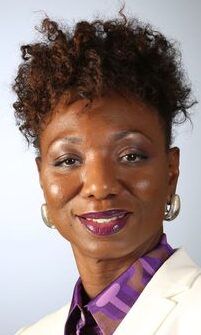 “I’ll get straight to it, because, you know, deadline: Monday is my final day with The Virginian-Pilot and the Daily Press,” Jamesetta Walker (pictured), features editor and a columnist for The Virginian-Pilot in Norfolk, wrote May 2. “Now, new opportunities await. I am moving on to become the How We Live editor for the USA Today Network’s Atlantic Region, overseeing the coverage of stories that intersect with race, culture and more. . . .”
“I’ll get straight to it, because, you know, deadline: Monday is my final day with The Virginian-Pilot and the Daily Press,” Jamesetta Walker (pictured), features editor and a columnist for The Virginian-Pilot in Norfolk, wrote May 2. “Now, new opportunities await. I am moving on to become the How We Live editor for the USA Today Network’s Atlantic Region, overseeing the coverage of stories that intersect with race, culture and more. . . .”
- “Leaders of the Black-Owned Media Matters movement will gather to showcase programming and talk about economic inclusion in the U.S. advertising industry during the Black-Owned Media Upfront 2021,” TVNewsCheck reported Monday. “Set for Tuesday and Wednesday, May 11 and 12 from noon to 2:30 p.m. ET, the event, presented by TVNewsCheck, will feature presentations and highlight programming from a variety of Black-owned media companies. . . .”
- “The manhunt for a murder suspect from Arizona who escaped near the Atlanta airport Thursday morning is over after a Channel 2 Action News crew spotted the suspect and alerted police,” Atlanta’s WSB-TV reported April 30. “J’ssan Carlos Strover, 20, is wanted in Arizona for first-degree murder, attempt to commit first degree murder and aggravated assault. Channel 2′s Matt Johnson and photojournalist Joe Booker were preparing their story Thursday night for WSB Tonight when they said Strover ran past their live truck and into some bushes. Johnson immediately called police and moments later, Strover was taken into custody. . . .”
- “This week, we’re celebrating NPR’s 50th anniversary, kicking off a series we’re calling We Hold These Truths to examine what’s working and what’s not in American democracy. And one of the underpinnings of democracy, without question, is property ownership,” Ailsa Chang reported Tuesday for NPR’s “All Things Considered.” She also said, “this week we’re going to look at the structural forces both from the government and the real estate industry that have denied Black Americans a fair shot at the American dream of home ownership.”
- Another discussion of NPR’s 50th anniversary took place Monday on “1A” from WAMU-FM in Washington, where Maria Hinojosa, anchor and executive producer of “Latino USA”; and Doug Mitchell, founder and project leader, NPR’s Next Generation Radio, which trains future broadcasters with an eye toward diversity, weighed in on “How will NPR change in the next 50 years? And how should it?“
 “With legacy newsrooms still failing to hire staff that reflect the communities they serve, independent news businesses are stepping up to show the industry what’s possible, and the difference it can make,” Ben DeJarnette reported Wednesday in introducing a podcast for Lion Publishers. “The Milwaukee Neighborhood News Service (MNNS) in Wisconsin is one of the organizations leading the way. In one of America’s most racially diverse cities, nearly 70 percent of MNNS’s paid staff members identify as people of color, including its top editor Ron Smith (pictured).”
“With legacy newsrooms still failing to hire staff that reflect the communities they serve, independent news businesses are stepping up to show the industry what’s possible, and the difference it can make,” Ben DeJarnette reported Wednesday in introducing a podcast for Lion Publishers. “The Milwaukee Neighborhood News Service (MNNS) in Wisconsin is one of the organizations leading the way. In one of America’s most racially diverse cities, nearly 70 percent of MNNS’s paid staff members identify as people of color, including its top editor Ron Smith (pictured).”
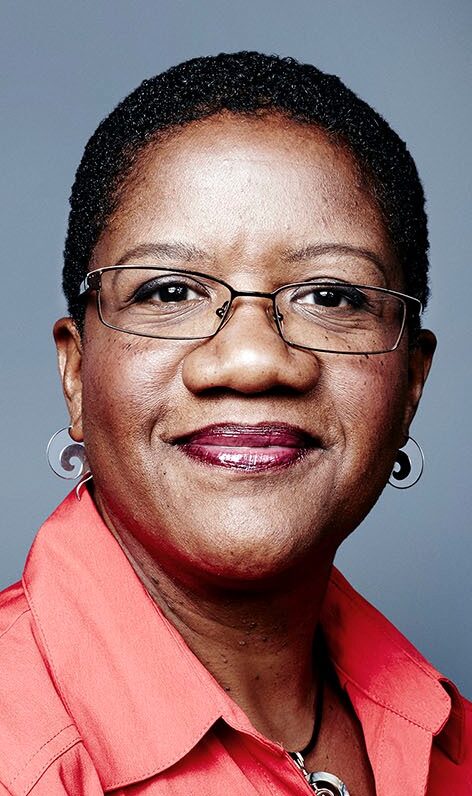 At CNN Digital, “Cathy Straight (pictured) has been promoted to VP of Features and Opinion for CNN Digital Worldwide. This new role will unite and elevate beats and views that expand CNN beyond our hard news coverage,” Meredith Artley, senior vice president and editor in chief, CNN Digital Worldwide, announced Tuesday along with other changes. “For the last nearly seven years, Cathy has led the national digital news desk to cover some of our most demanding stories, from the pandemic in the US, to protests, to so many shootings. She led the formation of the Race and Equality team. . . .”
At CNN Digital, “Cathy Straight (pictured) has been promoted to VP of Features and Opinion for CNN Digital Worldwide. This new role will unite and elevate beats and views that expand CNN beyond our hard news coverage,” Meredith Artley, senior vice president and editor in chief, CNN Digital Worldwide, announced Tuesday along with other changes. “For the last nearly seven years, Cathy has led the national digital news desk to cover some of our most demanding stories, from the pandemic in the US, to protests, to so many shootings. She led the formation of the Race and Equality team. . . .”
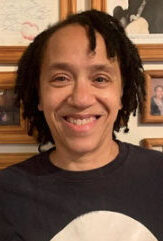 Non-New Yorkers might not be familiar with Linda Armstrong (pictured), a theater critic of 36 years who champions African Americans on stage and behind the scenes, one of the few of color in her line of work. Armstrong writes for the New York Amsterdam News and seemingly scores of other outlets. In an interview with veteran New York journalist Herb Boyd Monday for the New York Public Library for the Performing Arts (video), Armstrong said, “I want to be sure that my people have longevity with everything they’re trying to accomplish,” that her purpose as a theater writer is to give constructive criticism, and that more Black theater critics are needed. Asked who the rest of us should be watching, she named Donja R. Love, an LGBT playwright, and actor Daniel Beaty.
Non-New Yorkers might not be familiar with Linda Armstrong (pictured), a theater critic of 36 years who champions African Americans on stage and behind the scenes, one of the few of color in her line of work. Armstrong writes for the New York Amsterdam News and seemingly scores of other outlets. In an interview with veteran New York journalist Herb Boyd Monday for the New York Public Library for the Performing Arts (video), Armstrong said, “I want to be sure that my people have longevity with everything they’re trying to accomplish,” that her purpose as a theater writer is to give constructive criticism, and that more Black theater critics are needed. Asked who the rest of us should be watching, she named Donja R. Love, an LGBT playwright, and actor Daniel Beaty.
- Under the headline, “Philadelphia wins if Washington, D.C., becomes the 51st state,” the Philadelphia Inquirer endorsed statehood for the District of Columbia. The April 28 editorial said, “It is true that the majority of the Founding Fathers who met in Philadelphia in 1787 to draft the Constitution did not foresee Washington, D.C., becoming a state. But many of these white men also did not envision Black people being free or women voting. Admitting Washington, Douglass Commonwealth to the union as a 51st state is the next frontier — not paved in conquest, but in democratic participation. The entire union, including Philadelphia, will be better off for it.”
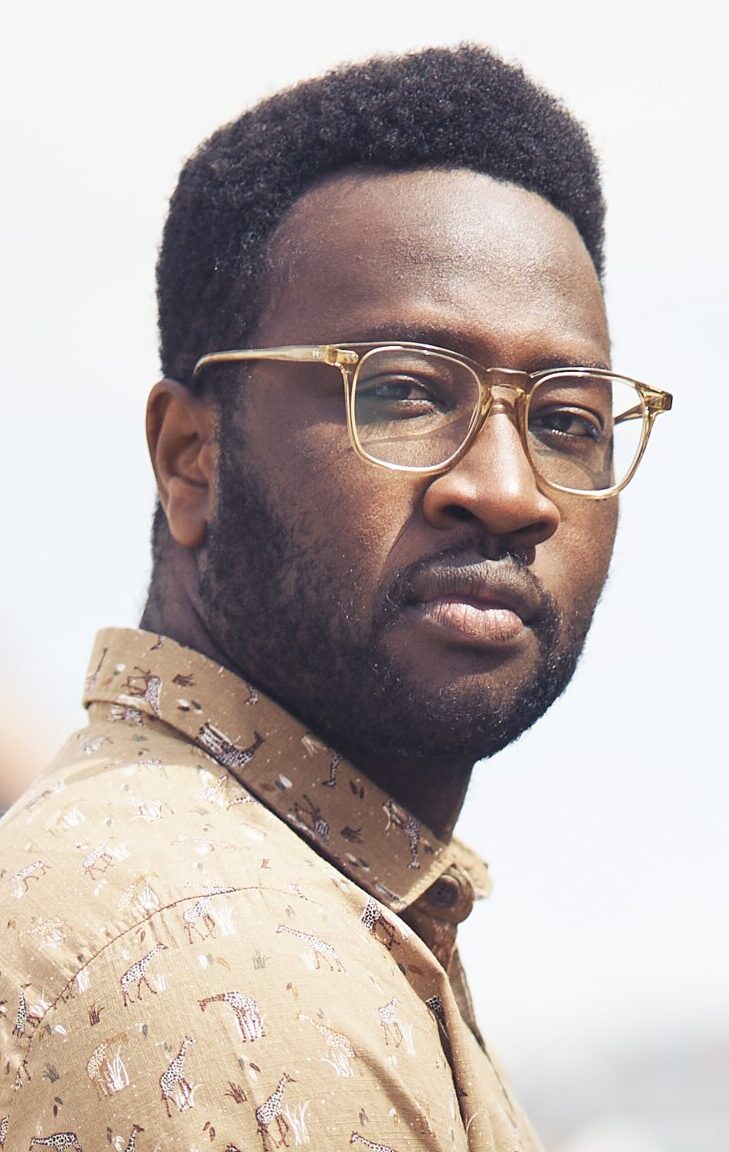 “The usual trend is that here we only talk about racism when a case occurs in the United States“(in Spanish), Moha Gerehou (pictured), a Black journalist and anti-racism activist in Spain, told a Spanish interviewer on March 5. “Then the media and institutions are mobilized, which otherwise are not capable of recognizing the existence of racism. Let’s stop looking so much there! And let’s look at what happens here, in Spain, with our neighbors, our partners, our friends. . . . ” Gerehou was quoted in a May 2 Associated Press story by Aritz Parra that noted, “while many condemned the murder of Black citizens by police in the United States, few reflected on domestic racism or Spain’s own history of colonialism, slavery and, according to [historian Antumi] Toasijé, ‘a long tradition of attempts to conduct ethnic cleansing.’ ”
“The usual trend is that here we only talk about racism when a case occurs in the United States“(in Spanish), Moha Gerehou (pictured), a Black journalist and anti-racism activist in Spain, told a Spanish interviewer on March 5. “Then the media and institutions are mobilized, which otherwise are not capable of recognizing the existence of racism. Let’s stop looking so much there! And let’s look at what happens here, in Spain, with our neighbors, our partners, our friends. . . . ” Gerehou was quoted in a May 2 Associated Press story by Aritz Parra that noted, “while many condemned the murder of Black citizens by police in the United States, few reflected on domestic racism or Spain’s own history of colonialism, slavery and, according to [historian Antumi] Toasijé, ‘a long tradition of attempts to conduct ethnic cleansing.’ ”
- “Meghan Markle has won her copyright claim against the publisher of the Mail On Sunday over the publication of a handwritten letter to her estranged father,” Britain’s Press Gazette reported Wednesday. “The Duchess of Sussex, 39, sued Associated Newspapers Limited (ANL), the publisher of the Mail On Sunday and Mail Online, over a series of articles which reproduced parts of a handwritten letter sent to Thomas Markle, 76, in August 2018. She claimed the five articles, published in print and online in February 2019, misused her private information, infringed her copyright and breached the Data Protection Act. . . .”
- “Bakosó,” a celebration of Cuba’s ever-evolving Afrobeat music and dance scene, part of the “AfroPop” series funded by Black Public Media and streamed on the World Channel, debuted last week on PBS. An affirmation of the cultural ties among the African diaspora, the film can also be seen online. Eric Arnold wrote Wednesday for KQED in the Bay Area, “The protagonist’s journey is captured in fantastic nuance and detail by filmmaker Eli Jacobs-Fantauzzi, a former Berkeley resident who now lives in Puerto Rico. Cuba’s picturesque scenery offers lots of opportunities for dynamic shots of everyday life — working-class people playing dominoes, kids playing soccer — but also stark contrast to American life. While Havana has become somewhat modernized, the rest of Cuba very much fits the definition of a so-called developing nation whose streets are more rural than urban.”
- In Ghana, “An office for the co-ordinated mechanism for the safety of journalists in the country has been set up in Accra and ready for use, the Minister of Information, Kojo Oppong Nkrumah, has announced,” Jonathan Donkor reported Wednesday for the Ghanaian Times. “He said it would receive complaints of alleged attacks and intimidation on journalists, validate same, follow up and push for conclusion of investigations and the sanctioning of culprits. Speaking at this year’s commemoration of World Press Freedom Day (WPFD) and flag hoisting ceremony in Accra yesterday, he said, the office, set up by the National Media Commission (NMC) with support from the Ministry, would also support journalists with the necessary skills on their safety. . . . “
A 21-second video of which we learned this morning shows the French journalist Olivier Dubois saying he was kidnapped by the “Support Group for Islam and Muslims” on 8/04. He asks his family & friends and the French authorities to do everything in their power to get him released. pic.twitter.com/yb3tpfo4oy
— RSF (@RSF_inter) May 5, 2021
- “A brutal jihadist conflict in the Sahel nations of Mali, Niger and Burkina Faso has left vast swathes of territory outside of state control, and thousands of people dead,” Agence France-Presse reported Saturday. “Journalists covering the insurgency often find themselves targeted by armed groups, either because of their reporting, or their ransom value. The considerable risks involved in practising journalism in the vast semi-arid region were underscored this week when it emerged that French reporter Olivier Dubois, who had gone missing, was likely being held captive by jihadists. . . .”
[btnsx id=”5768″]
To subscribe at no cost, please send an email to journal-isms+subscribe@groups.io and say who you are.
Facebook users: “Like” “Richard Prince’s Journal-isms” on Facebook.
Follow Richard Prince on Twitter @princeeditor
Richard Prince’s Journal-isms originates from Washington. It began in print before most of us knew what the internet was, and it would like to be referred to as a “column.” Any views expressed in the column are those of the person or organization quoted and not those of any other entity. Send tips, comments and concerns to Richard Prince at journal-isms+owner@
View previous columns (after Feb. 13, 2016).
View previous columns (before Feb. 13, 2016)
- Diversity’s Greatest Hits, 2018 (Jan. 4, 2019)
- Book Notes: Is Taking a Knee Really All That? (Dec. 20, 2018)
- Book Notes: Challenging ’45’ and Proudly Telling the Story (Dec. 18, 2018)
- Book Notes: Get Down With the Legends! (Dec. 11, 2018)
- Journalist Richard Prince w/Joe Madison (Sirius XM, April 18, 2018) (podcast)
- Richard Prince (journalist) (Wikipedia entry)
- February 2018 Podcast: Richard “Dick” Prince on the need for newsroom diversity (Gabriel Greschler, Student Press Law Center, Feb. 26, 2018)
- Diversity’s Greatest Hits, 2017 — Where Will They Take Us in the Year Ahead?
- Book Notes: Best Sellers, Uncovered Treasures, Overlooked History (Dec. 19, 2017)
- An advocate for diversity in the media is still pressing for representation, (Courtland Milloy, Washington Post, Nov. 28, 2017)
- Morgan Global Journalism Review: Journal-isms Journeys On (Aug. 31, 2017)
- Diversity’s Greatest Hits, 2016
- Book Notes: 16 Writers Dish About ‘Chelle,’ the First Lady
- Book Notes: From Coretta to Barack, and in Search of the Godfather
- Journal-isms’ Richard Prince Wants Your Ideas (FishbowlDC, Feb. 26, 2016)
- “JOURNAL-ISMS” IS LATEST TO BEAR BRUNT OF INDUSTRY’S ECONOMIC WOES (Feb. 19, 2016)
- Richard Prince with Charlayne Hunter-Gault,“PBS NewsHour,” “What stagnant diversity means for America’s newsrooms” (Dec. 15, 2015)
- Book Notes: Journalists Follow Their Passions
- Book Notes: Journalists Who Rocked Their World
- Book Notes: Hands Up! Read This!
- Book Notes: New Cosby Bio Looks Like a Best-Seller
- Journo-diversity advocate turns attention to Ezra Klein project (Erik Wemple, Washington Post, March 5, 2014)
![]()

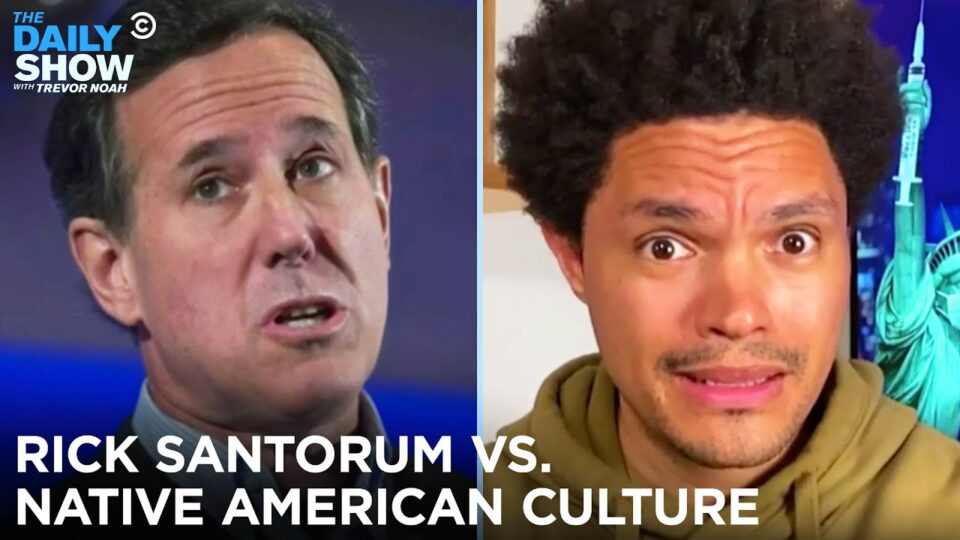
9 comments